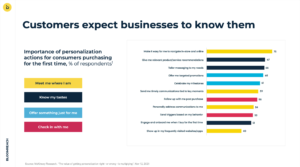Customer acquisition costs are higher than ever before. This means that retailers must perfect their personalization strategies to drive brand loyalty and increase customer lifetime value. In the latest CommerceNext webinar, “Spinning Up a Personalization Flywheel,” our panel of experts discussed how their companies have tackled personalization at scale.
What we learned:
- Use both customer and product data for ecommerce personalization.
- Organize a customer-centric model for personalization.
- Use consumer data transparently.
- Map out customer journeys to access vital personalization data.
Speakers:
- Samir Desai, EVP, Chief Digital and Technology Officer, Abercrombie & Fitch Co.
- Brian Hashemi, CMO, UncommonGoods
- Elyse Burack, Head of Consumer Marketing, Capsule
- Amanda Elam, CMO, Bloomreach
- Moderated by Scott Silverman , Co-Founder, CommerceNext
Keep reading for the webinar’s key insights or watch the recording below.
Where to Begin With Personalization—Manage the Data!
Personalization can be a struggle for everyone in the ecommerce industry. Why? We have so much data throughout the customer journey to sort through that we don’t know where to start.
Creating a winning ecommerce strategy is a long-term process. It’s hard to know where to start, but, to make it more manageable, Bloomreach uses a four-step ROI Flywheel as their personalization tool:
- Generate New Insights
- Test to Confirm
- Scale to All
- Connect Data
After steps 1-3 is when the real personalizing fun begins and it’s time to parlay those insights into experiences that truly make a difference to consumers. When customers shop online, they know you’re acquiring their data. Amanda Elam shared that “the consumer is willing to give you information if they know that that exchange of information is going to make their experience better.” Deliver end-to-end experiences for them. If a customer engages with your personalization strategies and makes a purchase, remove them from that segment at the moment of purchase.
It’s also recommended to have good company organization to foster an environment welcoming personalization. Modern commerce teams aren’t siloed—they’re centered around the customers. Set up objectives and KPIs following suit with this, focusing on customers.

According to McKinsey Research, customers expect business to know them, cater to them and impress them.
Personalization With Customers
Capsule, being a healthcare company, must be there for their customers in real time. People value human interaction more than ever before, because shopping has become so technologically advanced. Whenever they can, they try to avoid automating their customer journeys to foster human engagement. They also use a variety of different avenues, such as their app and through text, to give their customers important information.
Uncommon Goods gets personal with their customers by asking for first-party data to help their personalization program. By asking customers about their shopping behaviors, the brand can offer better and more personalized customer journeys.
Using Data and Experimentation
Personalization goes beyond simply putting a name into an email or text message, though this is a basic part of it. Data is central to personalization, but before jumping in, know what you mean to accomplish with the data you’re working with.
Uncommon Goods has invested in a more data minded culture, by inferring information from customer behavior. Though it doesn’t come easily. “Designing data is something you have to actively do.” Find the data structure that will reflect what customers are actually doing.
Abercrombie & Fitch has adopted a more customer centric model by investing in tech, such as CDPs to activate personalized experiences. Additionally, they’ve encouraged an “experimentation culture,” by running various experiments over time within personalization.
Personalization strategies can be a trial and error process for retailers. Uncommon Goods has found that they should avoid a standardized approach, as every consumer journey is unique. Additionally, customer segmentation needs to go beyond merchandise categories.
Cross-Departmental Collaboration for Personalization
In the quest for personalization, Abercrombie & Fitch struggled most with shifting away from a creative-led process to a more nimble design system for personalization teams to operate within a framework. They worked on mapping out the customer journey via brand and customer segment.
Capsule has also had success with cross-departmental collaboration to encourage personalization. Working in tandem, pods can map out customer journeys manually and learn to speak the same language as what the consumer is experiencing and looking for.
Personalization Success Story: Jenson
Using the right technology, one company that has seen a lot of success with personalization is Jenson USA. They personalize search by segment. This has led to an uplift in annual revenue by 5% and an increase in revenue per visit by 8.5%.
Ultimately, personalization is a layered process for which retailers must engage with extensive data and research to thrive. Our panel agrees that it is a key part of modern ecommerce, as customers are expecting more and more from ecommerce brands and online journeys.
If you’re interested in learning more or other ways to tackle rising customer acquisition costs, join us at CommerceNext 2022, the ecommerce growth show—we’ll cover all these topics and more to help your business tackle all of retail and ecommerce’s current challenges.
Related Posts
-
2022 Mother's Day Marketing Tips
The past two years of shutdowns have caused Mother’s Day…
-
How To Activate TikTok Marketing: A Case Study With Walmart
It’s no secret that in order to build lasting customer…
-
Opportunities and Challenges of Personalization at Scale
Personalization at scale is a great way to encourage customer…
-
Session Recap: Why Marketing Needs To Own The Customer Journey
With more places for customers to engage with your brand…
-
Session Recap: The Untapped ROI of Caring Post Sale
The stress and uncertainty of Covid-19 makes caring for customers…






